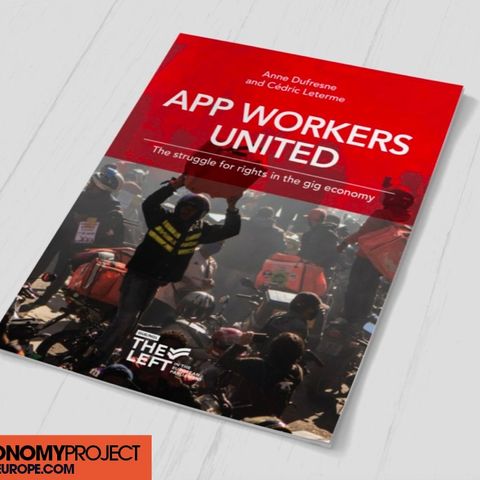‘We must say “no Uber law in Europe’”: Interview with Anne Dufresne
Oct 25, 2021 ·
33m 47s

Download and listen anywhere
Download your favorite episodes and enjoy them, wherever you are! Sign up or log in now to access offline listening.
Description
The European Commission’s directive on platform work is less than six weeks away. One way or another, it is likely to be a game-changer in Europe’s gig economy. If it...
show more
The European Commission’s directive on platform work is less than six weeks away. One way or another, it is likely to be a game-changer in Europe’s gig economy. If it introduces changes which force platform companies across the continent to hire workers as employees like any other, with full labour rights, it could be a fatal blow to the attempts by Uber, Glovo and the rest to continue to hire workers without taking any responsibility for their welfare.
On the otherhand, if the EU Commission were to introduce a law which was useful to the platforms’ in rejecting the various Supreme Court verdicts which have went against them on employment status, and cemented a “third-category” between employee and self-employed across the continent, it could be a major, permanent set-back for the progress the labour movement has made over the past year, in countries like Spain and Portugal where legislation for employment status of at least some platform workers has been introduced or will be introduced.
All this and more is occupying the minds of platform workers and activists travelling to Brussels from across Europe and beyond this week for the Alternatives to Uberisation Forum, on 27 October. One of those attending the forum is Anne Dufresne, a sociologist and researcher of atypical and international social mobilisation at the research group for alternative economic strategy in Brussels. Dufrense was the organiser of the first European assembly of couriers in 2018, and is involved in Allianza Unidos World Action, an international network for gig workers. She is also co-author of the ‘The struggle for rights in the gig economy’, with Cédric Leterme, published by the Left in the European Parliament in January 2021.
Before the forum, Ben Wray, Gig Economy Project co-ordinator, caught up with Dufresne in Brussels to talk about the EU Commission’s directive, her book and much more.
show less
On the otherhand, if the EU Commission were to introduce a law which was useful to the platforms’ in rejecting the various Supreme Court verdicts which have went against them on employment status, and cemented a “third-category” between employee and self-employed across the continent, it could be a major, permanent set-back for the progress the labour movement has made over the past year, in countries like Spain and Portugal where legislation for employment status of at least some platform workers has been introduced or will be introduced.
All this and more is occupying the minds of platform workers and activists travelling to Brussels from across Europe and beyond this week for the Alternatives to Uberisation Forum, on 27 October. One of those attending the forum is Anne Dufresne, a sociologist and researcher of atypical and international social mobilisation at the research group for alternative economic strategy in Brussels. Dufrense was the organiser of the first European assembly of couriers in 2018, and is involved in Allianza Unidos World Action, an international network for gig workers. She is also co-author of the ‘The struggle for rights in the gig economy’, with Cédric Leterme, published by the Left in the European Parliament in January 2021.
Before the forum, Ben Wray, Gig Economy Project co-ordinator, caught up with Dufresne in Brussels to talk about the EU Commission’s directive, her book and much more.
Information
| Author | The Gig Economy Project |
| Organization | The Gig Economy Project |
| Website | - |
| Tags |
Copyright 2024 - Spreaker Inc. an iHeartMedia Company
